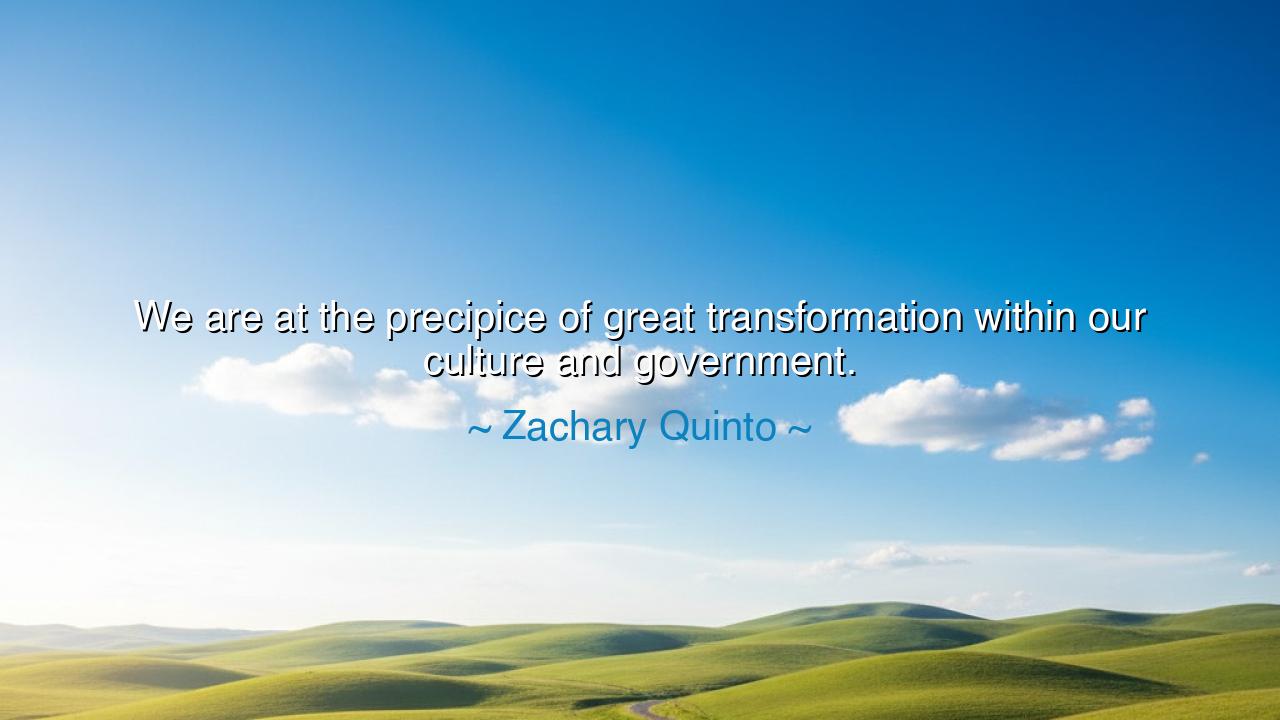
We are at the precipice of great transformation within our






"We are at the precipice of great transformation within our culture and government." – Zachary Quinto
In these solemn yet hopeful words, Zachary Quinto speaks as one standing at the edge of a vast and uncertain dawn. The “precipice of great transformation” is not merely a moment in time—it is the trembling instant before change overtakes us, the breath held between what humanity has been and what it is about to become. His words carry the weight of recognition: that societies, like souls, cannot remain still forever. When injustice deepens, when truth is buried beneath noise, when the old ways grow brittle and no longer serve life—then transformation becomes inevitable. It is not a choice, but a summons.
The origin of this quote lies in the early years of the twenty-first century, when Quinto, known for his artistry and activism, reflected upon a world in upheaval. The digital revolution was reshaping communication, economies, and identity itself; social movements were challenging long-standing structures of power; faith in government, media, and even truth was eroding. Quinto’s voice emerged from this turbulence, not as a prophet of despair, but as one calling for awakening. He perceived that both culture and government—the twin pillars of human civilization—stood before a test of integrity and imagination. Would they crumble under fear and division, or would they evolve toward greater wisdom and inclusion?
Throughout history, humanity has faced such precipices before. One may recall the Renaissance, born from the wreckage of medieval thought, when Europe stood between superstition and enlightenment. In that age, as in ours, the world seemed fractured and uncertain. Yet from that uncertainty arose brilliance—art, science, and the rediscovery of human potential. So too did the American Revolution mark another precipice, when ordinary people dared to reshape the very nature of governance, proclaiming liberty where monarchy once reigned. Each transformation was born from unrest, from tension, from the courageous refusal to remain as they were. In Quinto’s words, we hear the echo of these same tides stirring once more.
The phrase “great transformation” suggests not a gentle shift, but a profound reordering of the human spirit. Such transformations come with both promise and peril. They demand sacrifice from those who long for comfort, and courage from those who fear the unknown. When culture transforms, old traditions may shatter; when government transforms, old powers may resist. Yet progress has always required such breaking. The precipice, frightening though it may seem, is also sacred—it is the threshold between decay and rebirth.
Consider the story of Nelson Mandela and the transformation of South Africa. The nation once stood on the edge of collapse, divided by hatred and oppression. Yet from that abyss, Mandela and his people forged a new beginning—not without pain, not without loss, but with vision. They proved that transformation, when rooted in justice and compassion, can redeem even the darkest history. So too, Quinto reminds us, must our own era rise from its turbulence with courage enough to imagine a better world.
His quote also reflects a truth of the human condition: that culture and government are mirrors of the soul of the people. When those mirrors crack, it is not the institutions alone that falter—it is the collective conscience that demands renewal. The transformation he speaks of will not come solely from leaders or laws, but from the awakening of ordinary hearts. To heal culture, one must first heal one’s own indifference; to renew government, one must first renew faith in the power of participation, truth, and empathy. The precipice is not before us—it is within us.
The lesson, then, is both timeless and urgent: do not fear the precipice, for it is the place where the old self dies and the new world begins. In times of upheaval, resist cynicism; nurture clarity. Speak truth even when silence feels safer. Act with compassion even when anger burns hottest. Transformation is not a storm to survive—it is a fire to walk through. And those who walk through it with integrity will become the architects of the age to come.
So let Quinto’s words echo in the heart of every citizen and every soul: we stand together at the brink of change. Let us not retreat in fear, nor cling to what is dying. Instead, let us rise, as generations before us have risen, to shape a future worthy of our highest humanity. For though the precipice trembles beneath our feet, beyond it lies the promise of renewal—the rebirth of culture, the redemption of governance, and the enduring triumph of the human spirit.






AAdministratorAdministrator
Welcome, honored guests. Please leave a comment, we will respond soon